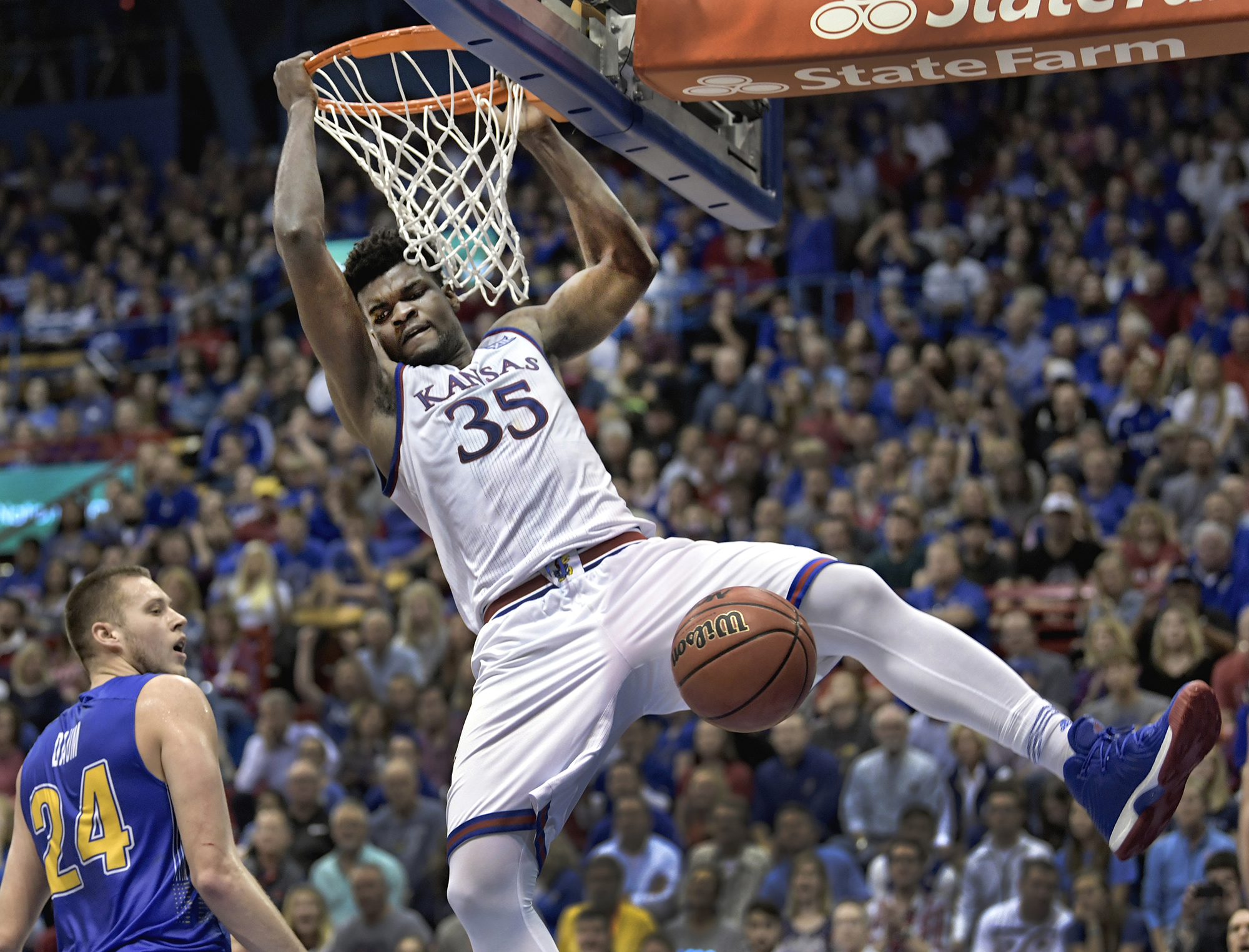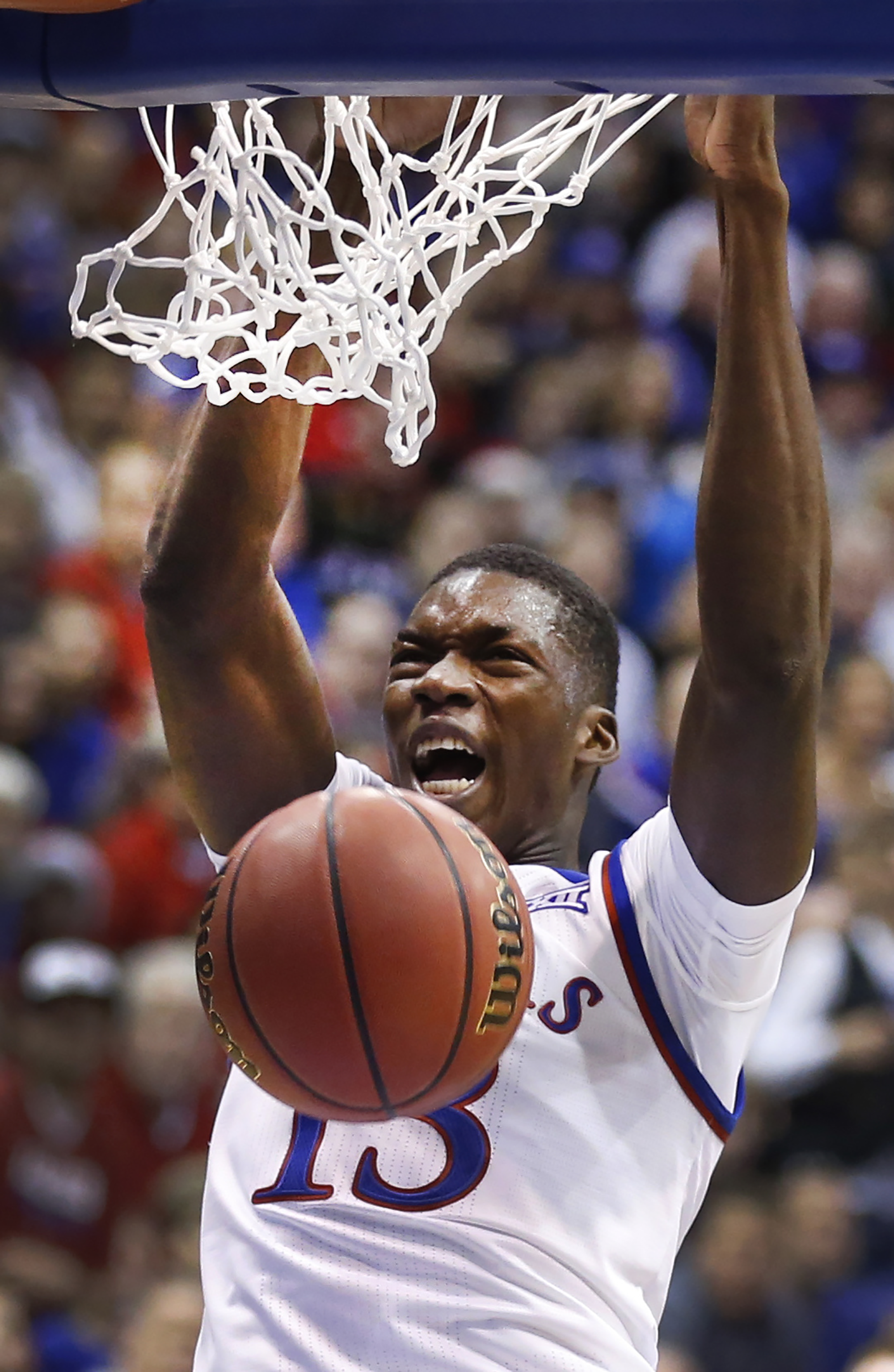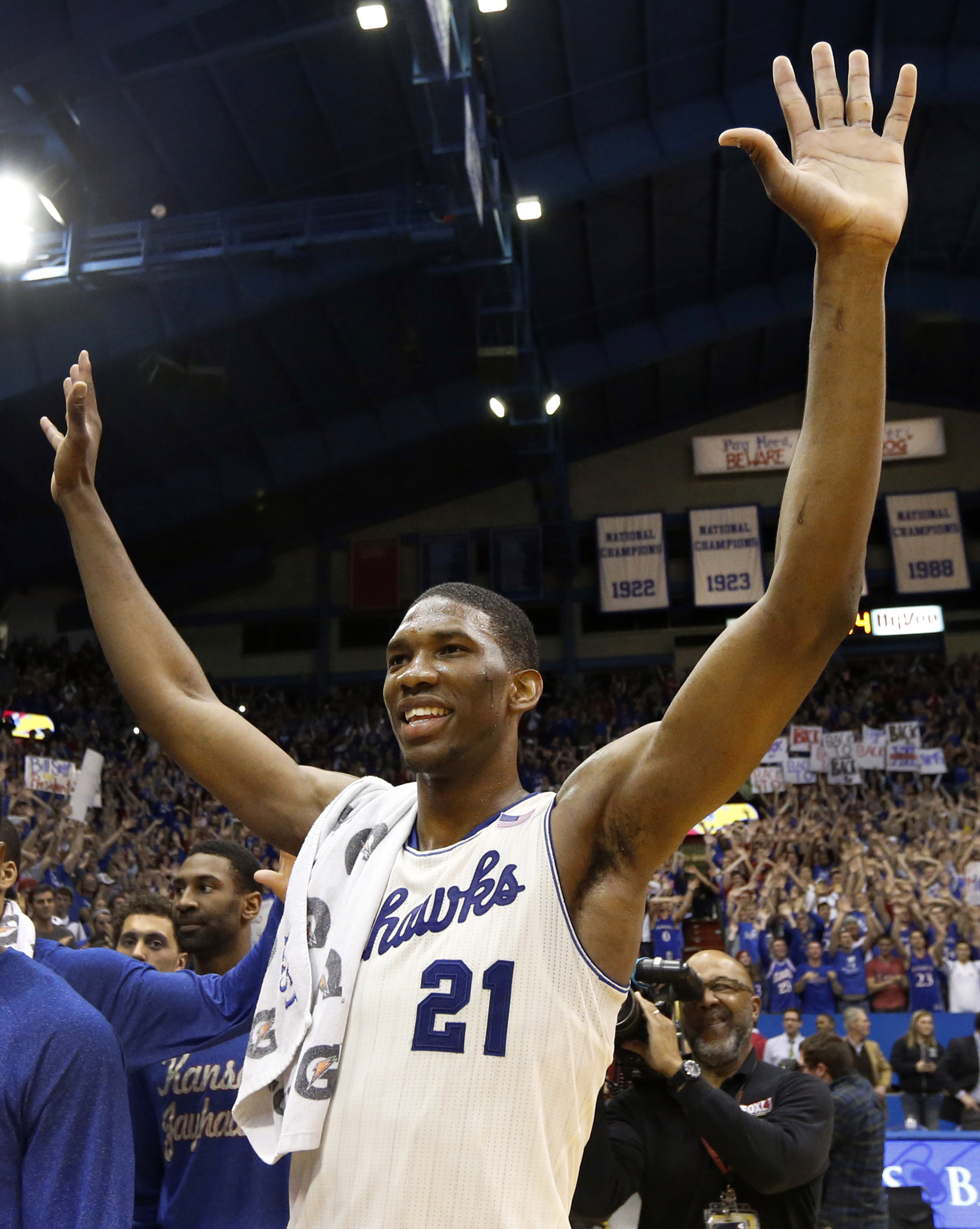RCW: Africa: The Last Frontier for Basketball




Watch part of the African connection play this season inside Allen Fieldhouse!
If you were to ask most college basketball players when they first started playing the game, the answers most often given would likely include, “As long as I can remember” or “Since I could walk.” These answers are easy to predict when asking players who grew up in the United States. The process in the U.S. is simple, you play in youth recreational leagues and if you are good enough, advance to an AAU travel team and the few truly talented ones will get a chance to play at the college level. But for those coming to the collegiate ranks from nations around the globe, specifically Africa, the process could not be any different.
The Kansas men’s basketball team has grown used to developing players who have come from outside the normal-recruiting circles. Over the past five years, Kansas has recruited four African-born players in Joel Embiid (Cameroon), Cheick Diallo (Mali), current sophomore Udoka Azubuike (Nigeria) and recent Jayhawk addition freshman Silvio De Sousa (Angola). With many players from the African nations rarely beginning their basketball journeys before the age of 15, the stories of how they came to play on the hardwood are often unique, and these four Jayhawks are no exception.
“Africa is the last frontier of basketball in the world because there is not a lot of organized basketball systems throughout Africa,” said ESPN commentator Fran Fraschilla. “Africa is a huge continent and is a relatively poor continent so the basketball structure in the various countries throughout that continent is very limited. There are not a lot of indoor courts and not a lot of coaching.”
The National Basketball Association (NBA) is really starting to pour into the African continent and bring many resources to develop the country and make basketball a more universal sport. There have also been a number of mentors from Africa who have come to the United States, played at the college or pro level then gone back to their home country to mentor young players with potential talent. These mentors serve as a guide to help the players transition to life in the United States.
“Many African players are leaving these small villages and there leaving a culture that they are completely emerged in to come to a culture that they know nothing about other than what they’ve seen on TV and in movies,” said Fraschilla. “Most of these kids who come from Africa have no idea what to expect other than they’ve heard America is a land of great opportunity.”
Many young African players are truly taking a leap of faith and trusting their mentors when making the decision to come to the United States, and their ability to play basketball at a high level is just an added bonus in the land of opportunity. Azubuike, for example, did not truly start playing organized basketball until he came to the United States in ninth grade.
“I started playing a little bit in Africa, but it was mainly just dribbling the ball. I really didn’t know much about the game of basketball or the rules,” said Azubuike. “It was just a fun type of thing where I just went out and had fun.”
A key factor in a player’s decision to move across the world, oftentimes on their own, is the opportunity to receive a better education and attend a university.
“I came to the U.S., first for academics,” said Azubuike. “My mom really stressed the importance of school as well as religion. So, the school I went to in Florida was a religious school and it was a great academic school to prepare me for college. That is why I came to the U.S.”
Almost echoing what Azubuike had to say about educational opportunities in the U.S., Fraschilla also talked about the importance of education to many of the African college and NBA players seen today.
“By and large, they want to come to the United States, they want to go to high school, they want to go to college, and some of them want to play professionally,” said Fraschilla. “It’s a new frontier. Not only KU, but colleges everywhere, high schools and prep schools are placing kids from the continent (of Africa) so that they can get an education and potentially play basketball.”
Although the young players are choosing to move to the U.S., it is no easy decision. Many of them are leaving their families behind, adjusting to a new language and culture and are uncertain about what their futures hold.
“The hardest part about coming to the U.S., was living without my family, that was a huge adjustment,” said Azubuike. “We learned English at school in Nigeria so that really wasn’t that hard, but I had to adjust to some stuff but I was already pretty good at speaking English. It was hard to adjust to school however, because it is a whole different system in Nigeria.”
So not only is the lifestyle and the language a change in every day, but the transition into playing organized basketball in the U.S., is also an adjustment due to the fact that basketball is not a popular sport in Africa.
Soccer is the sport of choice all over the African continent and many of these players grow up playing the sport alongside their schoolmates. Another very popular sport is volleyball. In fact, Embiid planned on playing professional volleyball in Europe before finding his calling on the hardwood. So, while these players are not born basketball players they are typically athletically inclined and very much involved in sports overall.
“Most of the players who come (to the U.S.) have a huge soccer background so they usually have decent feet,” said Kansas men’s basketball assistant coach Norm Roberts. “Cheick had a soccer background, Joel had a big soccer background and Udoka, not as much, but a little bit. So, hand eye coordination, catching a ball, getting a feel for the game was all there and we knew we never had to worry about their energy or effort.”
Many of these players are highly recruited athletes even though they have played the game of basketball for such a short amount of time. However, their raw talent, combined with their abilities to adapt to new situations, breeds a great all-around athlete.
“The guys have done well here but I think they’re going to do well anywhere they go,” said Roberts. “The one thing that is unique about African kids, and any kind of international player, is they’ve already been away from home. Some of those kids haven’t seen their families in three or four years, so they already know how to adjust to moving to a different part of the state or country and adjust to that environment and that lifestyle.”
Roberts also touched on the recruiting process of these athletes and the one major difference between the African players and U.S. born players is focus.
“The focus for them is to be as good as they can be on and off the court,” Roberts said. “They are more structured in that they understand the importance of time and always being where they are supposed to be. The kids in the U.S., are a little more spoiled; they have things, where these other kids don’t have as much and they’re extremely grateful when they do get things.”
The African players also shared a special connection before attending Kansas. If it were not for Diallo or Embiid, Azubuike may have never picked Kansas to further his education and his basketball career. The three players met multiple times throughout their high school careers. Embiid and Azubuike’s prep schools were in the same conference, so they were able to play against one another a couple of times a year and continued to stay in touch with one another throughout the years.
Azubuike and Diallo also share a special connection, meeting for the first time after playing against each other in a national championship game and continuing the friendship when Azubuike was being recruited by the Jayhawks after Diallo had already donned the Crimson and Blue in Lawrence for a year.
“After the national championship game, me and Cheick just kept communicating,” said Azubuike. “Right before I came to visit KU I was communicating with Joel, but me and Cheick were talking every day. They were definitely a part of why I chose Kansas.”
Fraschilla is a firm believer that KU’s big-name African players like Embiid and Diallo will only help Kansas’ ability to recruit other foreign-born players. Each is now living the ultimate dream, playing in the NBA, and making an impact on their team; Embiid for the Philadelphia 76ers and Diallo for the New Orleans Pelicans.
“For KU particularly, a guy like Joel is going to open up a lot of doors because he is now a world-wide name in the basketball community so he is certainly going to be a great ambassador for KU going forward,” said Fraschilla.
The development of these players during their respective stints at Kansas has been huge to their success already and as they continue to grow and learn while playing professionally, their individual games will only get better.
“They’re all great kids. They all play with a motor. Obviously, they are all tall and big and they all can do different things,” said Roberts. “Joel was such a talent with his hands, his footwork and ability to score. Cheick was just a motor with his shot blocking and toughness. (For) Udoka (it’s) his size, physicality, what he can do. But they’re all very easy kids to recruit because they’re kids who want to build relationships; (they’re) easy to talk to and they’ve all come to the U.S., to make their lives better.”
So it isn’t really about where one starts, but where one finishes. For the African-born Kansas basketball players, the final destination has been impressive to date with Embiid and Diallo both competing in the NBA. Azubuike, and now De Sousa, are certainly preparing to follow suit.



